Related Research Articles

A massage parlor, or massage parlour, is a place where massage services are provided. Some massage parlors are front organizations for prostitution and the term "massage parlor" has also become a euphemism for a brothel.
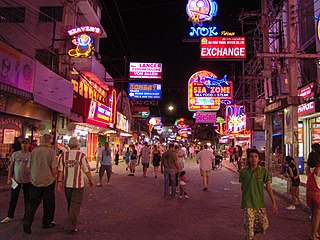
Prostitution in Thailand is not itself illegal, but public solicitation for prostitution is prohibited if it is carried out "openly and shamelessly" or "causes nuisance to the public". Due to police corruption and an economic reliance on prostitution dating back to the Vietnam War, it remains a significant presence in the country. It results from poverty, low levels of education and a lack of employment in rural areas. Prostitutes mostly come from the northeastern (Isan) region of Thailand, from ethnic minorities or from neighbouring countries, especially Cambodia, Myanmar, and Laos. In 2019, the Joint United Nations Programme on HIV/AIDS (UNAIDS) estimated the total population of sex workers in Thailand to be 43,000.

In Great Britain, the act of engaging in sex or exchanging various sexual services for money is legal, but a number of related activities, including soliciting in a public place, kerb crawling, owning or managing a brothel, and pimping, are illegal. In Northern Ireland, which previously had similar laws, paying for sex became illegal from 1 June 2015.
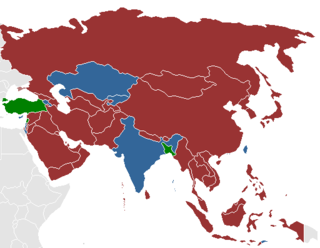
Prostitution is legal in India, but a number of related activities including soliciting, kerb crawling, owning or managing a brothel, prostitution in a hotel, child prostitution, pimping and pandering are illegal. There are, however, many brothels illegally operating in Indian cities including Mumbai, Delhi, Kolkata, Pune, and Nagpur, among others. UNAIDS estimate there were 657,829 prostitutes in the country as of 2016. Other unofficial estimates have calculated India has roughly 3 million prostitutes. India is widely regarded as having one of the world's largest commercial sex industry. It has emerged as a global hub of sex tourism, attracting sex tourists from wealthy countries. The sex industry in India is a multi-billion dollar one, and one of the fastest growing.
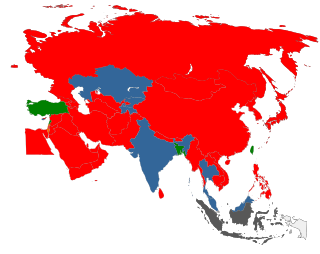
The legality of prostitution in Asia varies by country. There is often a significant difference in Asia between prostitution laws and the practice of prostitution. In 2011, the Asian Commission on AIDS estimated there were 10 million sex workers in Asia and 75 million male customers.

Prostitution is illegal in the vast majority of the United States as a result of state laws rather than federal laws. It is, however, legal in some rural counties within the state of Nevada. Additionally, it is decriminalized to sell sex in the state of Maine, but illegal to buy sex. Prostitution nevertheless occurs elsewhere in the country.
Prostitution in Myanmar is illegal, but widespread. Prostitution is a major social issue that particularly affects women and children. UNAIDS estimate there to be 66,000 prostitutes in the country.
Prostitution in Singapore in itself is not illegal, but various prostitution-related activities are criminalized. This includes public solicitation, living on the earnings of a prostitute and maintaining a brothel. In practice, police unofficially tolerate and monitor a limited number of brothels. Prostitutes in such establishments are required to undergo periodic health checks and must carry a health card.
Prostitution in Jamaica is illegal but widely tolerated, especially in tourist areas. UNAIDS estimate there to be 18,696 prostitutes in the country.

The Prostitution Reform Act 2003 is an Act of Parliament that decriminalised prostitution in New Zealand. The Act also gave new rights to sex workers. It has attracted international attention, although its reception has been mixed. The Act repealed the Massage Parlours Act 1978 and the associated regulations.
Prostitution in Kenya is widespread. The legal situation is complex. Although prostitution is not criminalised by National law, municipal by-laws may prohibit it.. It is illegal to profit from the prostitution of others, and to aid, abet, compel or incite prostitution.. UNAIDS estimate there to be 133,675 prostitutes in the country.
Prostitution in Malaysia is restricted in all states despite it being widespread in the country. Related activities such as soliciting and brothels are illegal. In the two states of Terengganu and Kelantan, Muslims convicted of prostitution may be punishable with public caning.
Prostitution in Croatia is illegal but common. Forcible prostitution, any kind of brothels, or procuring are treated as a felony, while voluntary prostitution is considered to be infraction against public order. Like in many other Southeast European countries, the problem of human trafficking for the purposes of sex is big in Croatia.

The legal status of prostitution in Africa varies widely. It is frequently common in practice, partially driven by the widespread poverty in many sub-Saharan African countries, and is one of the drivers for the prevalence of AIDS in Africa. Senegal and Côte d'Ivoire permit the operations of brothels. In other countries, prostitution may be legal, but brothels are not allowed to operate. In some countries where prostitution is illegal, the law is rarely enforced.
Prostitution in Namibia is legal and a highly prevalent common practice. Related activities such as solicitation, procuring and being involved in the running of a brothel are illegal. A World Bank study estimated there were about 11,000 prostitutes in Namibia.
Prostitution in Hawaii is illegal but common. There are about 150 brothels in Oahu alone.

Prostitution is legal in Macau unlike in mainland China, because the city is a special administrative region of the country. However, operating a brothel and procuring are both illegal in Macau, with the latter punishable by a maximum jail sentence of 8 years. Street prostitution is illegal but sex work in a massage parlor is considered to be de facto legal. The city has a large sex trade despite there being no official red-light district. In addition to street prostitution, prostitutes work in low-rent buildings, massage parlours and illegal brothels, and the casinos, nightclubs, saunas and some of the larger hotels. Most hotels, however, have suspected prostitutes removed from the premises. Many of the city's sidewalks and underpasses are littered with prostitutes' calling cards.
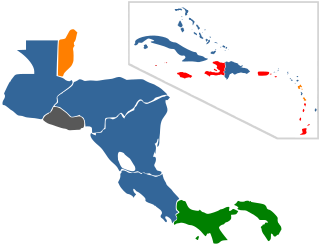
Legality of prostitution in the Americas varies by country. Most countries only legalized prostitution, with the act of exchanging money for sexual services legal. The level of enforcement varies by country. One country, the United States, is unique as legality of prostitution is not the responsibility of the federal government, but rather state, territorial, and federal district's responsibility.
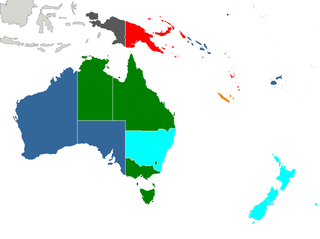
Prostitution in Oceania varies greatly across the region. In American Samoa, for instance, prostitution is illegal, whereas in New Zealand most aspects of the trade are decriminalised.
Prostitution in the Solomon Islands is legal but related activities such as soliciting and brothel keeping are prohibited. Prostitution occurs mainly in the capital, Honiara, and around logging camps in Makira, Malaita and Isabel islands. Many of the women involved have turned to prostitution due to poverty, some starting at the age of 13. The laws are rarely enforced.
References
- 1 2 3 4 5 6 7 Posmanick-Cooper, Lindsey; Rustick, Holly M. (2015). "An Analysis of Human Trafficking Indicators on Guam" (PDF). Outreach and Research Subcommittee, Guam Human Trafficking Task Force - Office of the U.S. Attorney for Guam and the Northern Marianas. Retrieved November 22, 2017.
- 1 2 "GCA Crimes and Correction" (PDF). Guam Courts. Retrieved November 22, 2017.
- ↑ "Sex Work Legal Info". Exotic Documentary. Retrieved November 22, 2017.
- ↑ Souder-Jaffery, Laura Marie Torres (1992). Daughters of the island : contemporary Chamorro women organizers on Guam (2nd ed.). Lanham: University Press of America. pp. 83–84. ISBN 9780819186072.
- ↑ Bevaqua, Michael Lujan (December 31, 2015). "When the Moon Waxes: Not-so-comforting apologies". Marianas Variety. Retrieved November 22, 2017.
- ↑ Okihiro, Gary Y (2015). American History Unbound: Asians and Pacific Islanders. University of California Press. p. 369.
- 1 2 Partido, Gerry R. (January 22, 2017). "Expert: Tighter policies on massage parlors can curb trafficking". The Guam Daily Post. Retrieved February 4, 2018.
- ↑ "Guam's Red-Light Zoning Proposal: "Look at a map"
How Will This Zoning Proposal Square with the US Military's Prohibition on Facilitating Human Trafficking?". Kathryn Cramer. Retrieved February 5, 2018. - ↑ "NGO in Guam warns human trafficking is a big problem". Radio New Zealand . August 29, 2014. Retrieved February 4, 2018.
- ↑ "Federal bill could greatly help Guam's human trafficking problem". Kuam News. July 14, 2017. Retrieved February 4, 2018.
- ↑ "Guam bar owner sentenced to life in prison for sex trafficking". US Immigration and Customs Enforcement. September 20, 2012. Retrieved February 4, 2018.
- ↑ Parinas, Aisabel (May 19, 2015). "Human and Sex Trafficking on Guam". Prezi. Retrieved February 4, 2018.